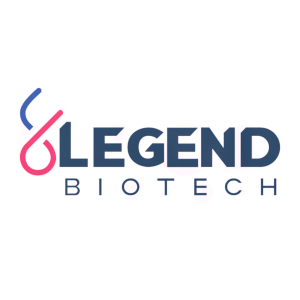Legend Biotech Announces FDA Clearance of the IND for LB1901, an Investigational Autologous Anti-CD4 CAR-T Therapy for Relapsed or Refractory T-Cell Lymphoma
Legend Biotech Corporation (NASDAQ: LEGN) (“Legend Biotech”), a global clinical-stage biopharmaceutical company engaged in the discovery and development of novel cell therapies for oncology and other indications, today announced that the U.S. Food and Drug Administration (FDA) has cleared its Investigational New Drug (IND) application to evaluate LB1901, the company’s investigational autologous chimeric antigen receptor T-cell (CAR-T) therapy, for the treatment of adults with relapsed or refractory T-cell lymphoma (TCL). Under this IND, Legend will initiate a Phase 1 clinical study for LB1901 in the United States.
LB1901 is an investigational CAR-T product targeting CD4, which is a surface membrane glycoprotein uniformly expressed in a majority of TCL subtypes. A Phase 1, first-in-human, open-label, multicenter, multicohort clinical study will enroll patients with relapsed or refractory peripheral T-cell lymphoma (PTCL) or cutaneous T-cell lymphoma (CTCL) in the United States. The primary objectives of the study are to characterize the safety and tolerability of LB1901 and to determine the recommended Phase 2 dose.
TCL is a heterogeneous group of disorders accounting for less than 15 percent of Non-Hodgkin lymphoma cases in the US.1,2 PTCL comprises subtypes which are uncommon and often aggressive, with a 5-year overall survival of
“The FDA’s clearance of Legend’s IND application for LB1901 is a milestone representative of the company’s scientific expertise in cell therapy innovation,” said Ying Huang, PhD, Chief Executive Officer and Chief Financial Officer of Legend Biotech. “We look forward to working with the investigators as we explore its potential in meeting the great unmet medical needs in the TCL population.”
About Legend Biotech
Legend Biotech is a global clinical-stage biopharmaceutical company engaged in the discovery and development of novel cell therapies for oncology and other indications. Our team of more than 800 employees across the United States, China and Europe, along with our differentiated technology, global development, and manufacturing strategies and expertise, provide us with the strong potential to discover, develop, and manufacture cutting edge cell therapies for patients in need.
Cautions Concerning Forward-Looking Statements
This information constitutes forward-looking statements relating to the business of Legend, including express or implied discussions regarding the clinical development of its product candidates and potential attributes and benefits of such product candidates. Such forward-looking statements reflect the current views of Legend’s management regarding future events, and involve known and unknown risks, uncertainties and other factors that may cause actual results to be materially different from any future results, performance or achievements expressed or implied by such statements. In particular, Legend’s expectations could be affected by, among other things, uncertainties involved in the development of new pharmaceutical products; unexpected clinical trial results, including additional analysis of existing clinical data or unexpected new clinical data; unexpected regulatory actions or delays or government regulation generally; Legend’s ability to obtain or maintain patent or other proprietary intellectual property protection; competition in general; government, industry, and general public pricing and other political pressures. Should one or more of these risks or uncertainties materialize, or should underlying assumptions prove incorrect, actual results may vary materially from those described herein as anticipated, believed, estimated or expected.
The safety and efficacy of the product candidates and/or uses under investigation have not been established. There is no guarantee that the product candidates will receive health authority approval or become commercially available in any country for the uses being investigated.
The information in this press release speaks only as of the date hereof. Legend assumes no duty to update the information to reflect subsequent developments. Readers should not rely upon the information on this page as current or accurate after its publication date.
________________________________
1 Scherer LD, Brenner MK, Mamonkln M. Chimeric antigen receptors for T-cell malignancies. Frontiers in Oncology. 2019 March;9(article 126):1-10.
2 American Cancer Society. Types of T-cell Lymphoma. Available at: https://www.cancer.org/cancer/non-hodgkin-lymphoma/about/t-cell-lymphoma.html. Accessed December 2020.
3 Casulo C, O’Connor O, Shustov A, Fanale M, Friedberg JW, Leonard JP, et al. T-cell lymphoma: Recent advances in characterization and new opportunities for treatment. J Natl Cancer Inst. 2017;109(2):1-9.
4 Abouyabis AN, Shenoy PJ, Sinha R, Flowers CR, Lechowicz MJ. A systematic review and meta-analysis of front-line anthracycline based chemotherapy regimens for peripheral T-cell lymphoma. ISRN Hematol. 2011;2011:623924.
5 Scarfo I, Frigault M, Maus M. CAR-based approaches to cutaneous T-cell lymphoma. Frontiers in Oncology. 2019;9(article 259):1-6.
View source version on businesswire.com: https://www.businesswire.com/news/home/20201214005067/en/







